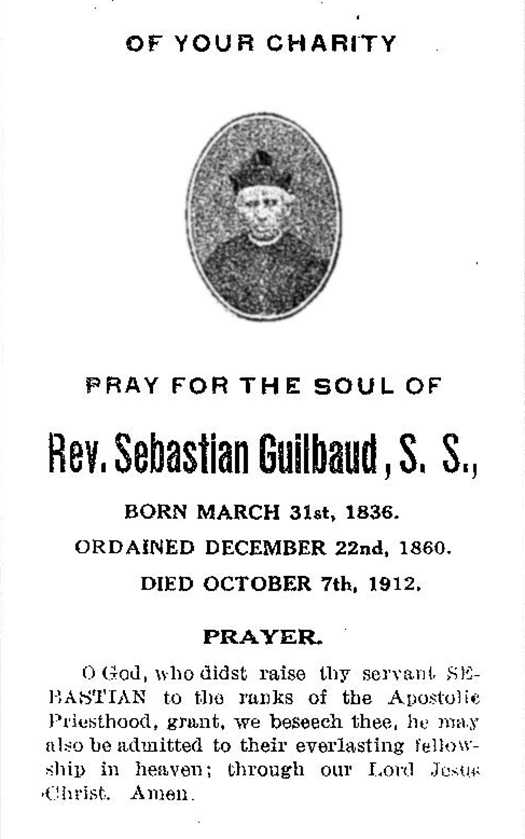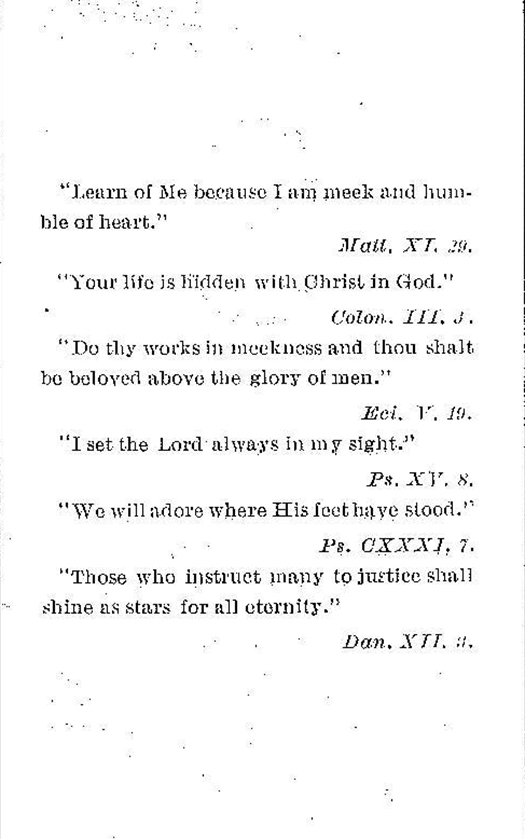Guilbaud, Father Sebastian
1912, October 7
Date of Birth: 1836, March 31
Paris
March 16, 1913
Fathers and Very Dear in Our Lord:
We have received from Father McKenny of St. Charles the following letter about Father Guilbaud. We send it on to you in its original text. It is the testimony of a life-long companion. With the advantage of its very precise information, we find in it the proof of the deep impression left on St. Charles by the revered deceased.
“Very honored Father: I am sending you the material for the official obituary notice of our holy confrere, Father Guilbaud, who died some months ago. I hope that God in His goodness will send us other confreres like him to carry on the spirit of St. Sulpice in our American houses, especially at St. Charles. Pray for us …”
Father Sebastien Guilbaud was born on March 31, 1836, at St. Mars de Coutais in the Diocese of Nantes. His classical studies, undertaken at Machecoul in a little college of which he kept a fine memory, were finished at the minor seminary of Nantes. In 1855 he entered Philosophy, and two years later he began Theology at the major seminary of the same city. During his year of advanced studies at St. Sulpice, he was ordained to the priesthood on December 22, 1860. When Solitude ended, he wanted to go to America where he arrived in 1862.
He remained at St. Charles from 1862 to 1866. In 1866 he left the college to go to teach at St. Mary’s in Baltimore. But he preferred the college kind of life, and in 1870 he was allowed to go back there. He stayed there till his death on October 7, 1912.
On the day of the fire which destroyed the college, Father Guilbaud was moved from the house as soon as the danger became evident and was taken to an accommodating neighbor’s. He left there late that evening and was spared the sight of the ruins of the college. But in spite of all that, the shock was too much, and the wound to his sensitive heart never healed. After spending two or three months at the seminary in Baltimore, he was able to come to Catonsville, where the college had reopened some days after the fire.
For a while he seemed to snap back. But an illness from which he was already suffering without telling anyone – probably without any suspicion of its seriousness – took a turn for the worse, and he had to consult the doctor. Remedies brought him little relief. He had to give up saying Mass. He was, for a while at least, able to keep on being present at the Holy Sacrifice and to receive Holy Communion.
Several times it was suggested that his special health needs be provided for outside the house, but he showed so much reluctance for that, that we hated to insist. However, his condition became such that towards the end of September he decided on his own to seek admittance to St. Agnes Hospital. During the first days after he went in, treatment brought about some improvement, but it was all the more apparent that there was still danger. Soon it became even worse. On Saturday, October 5th, the Superior of St. Charles was informed, and he went to the hospital. But he was too late to administer the last sacraments – it had been thought prudent to ask the chaplain to perform the rites. The patient was fully conscious. The last two days were marked by repeated episodes which left no doubt that the end was near. For one who had sometimes expressed a great fear of death, he seemed to watch its approach without being troubled or anxious.
He was able to bless the confreres who came to visit him, sending his blessing to those not there, to his family, especially to his nephew who was to be ordained some months later. On Monday morning, October 7th, he was well enough to receive Holy Communion, but during the day attacks of weakness recurred, and he expired about six in the evening.
Father Guilbaud was the last representative of a generation of men who by their constant application to the humble and hard work of the classroom, by their unstinting dedication to their students and penitents, by their piety and spirit of faith, have given great service to St. Charles and to St. Sulpice in the United States.
The ability to speak of Father Guilbaud requires that one have penetrated into his heart and to have learned there all his goodness and delicacy. All noble causes were his. For him, God was a Father of Whom it could be said that he constantly felt His presence. When he spoke of Him, it was his whole soul that spoke; and, without doubt, it was the simplicity of his words – all full of rich, fruitful, solid and practical ideas – which made his meditations so well liked. His piety toward the Blessed Sacrament had induced him to become a member of the Association of Priest Adorers. For several years he translated articles on the Eucharist for the monthly publication of the Blessed Sacrament Fathers. When his deafness made teaching difficult for him and made him consider himself less useful for St. Sulpice, he even briefly gave thought (very quickly vetoed by his Superior) to becoming a Blessed Sacrament Father. He compensated in his last years by making an hour’s adoration each day.
His devotion to the Blessed Virgin was touching. With what love he spoke of her! With what zeal he busied himself in advancing her worship and her glory! He was an avid reader of the “Annals of Lourdes,” and he took delight in following the accounts of the miracles which took place there. Especially at the time of the national pilgrimage each year, his most fervent and continual prayers kept him in intimate communion with the pious faithful assembled for this gathering.
For him the Church was a mother, all of whose joys and sorrows were his own. He was particularly interested in the missions, where he had relatives and friends. It was with interest that he read of their labors and sufferings. From his meager savings he supported their endeavors. The Church of France, especially, from the start of its current crisis, was the object of his unending concern, and here again, his heart underlay his actions. Not only did he pray, but he managed from his small resources to undertake a work in which he saw a glimmer of hope for the reunion of France and the Church of France. It was that same sentiment which made him interest himself in all the details of the crisis which was bound to have an effect on St. Sulpice both in France and in America. With him it was not mere curiosity but a need of the heart. His charity overlooked nothing, refused nothing. He followed beyond the grave the souls of those whom he loved, with a special attachment for the most forgotten. From that came the inspiration of joining the work of Montligeon and of arranging its extension in America. The living lost nothing by that devotion which became in his last years quite strong. These especially who were close to him, confreres or disciples, reaped every day the example and the fruit of his devotion, humble, delicate, and so good. Not only did he harm no one, not only did he do everything in his power, but it was felt that he was making his own the joys and especially the sorrows of others. It was as if Father Guilbaud were forgetting himself in order to think only of God and of the world to come. In the last months of his life he very often expressed the fear of not being charitable enough. This concern showed itself even on his deathbed when he spoke his gracious thanks to the priest who attended him.
The very evening of his death, the remains of the dear deceased were brought back to the college. The funeral was held the following Thursday, October 11th. His Eminence, Cardinal Gibbons, presided. Auxiliary Bishop of Baltimore Corrigan sang the Mass. Bishop Monaghan of Wilmington, several dignitaries, and about sixty priests came to pay their respects and show their affection. Father Matthews, a Washington pastor and a very dear friend of the good Father Guilbaud, reflected those feelings of respect and affection in speaking of the virtues of the perfect Sulpician whom we had lost. He told a little anecdote of a St. Charles student who, on seeing Father Guilbaud leaving for a voyage to France, said: “It is the college’s saint who is leaving.”
I recommend this dear confrere to your prayers, and I renew to you the expression of my very devoted sentiments in Our Lord.
H. Garriguet
Superior of St. Sulpice


